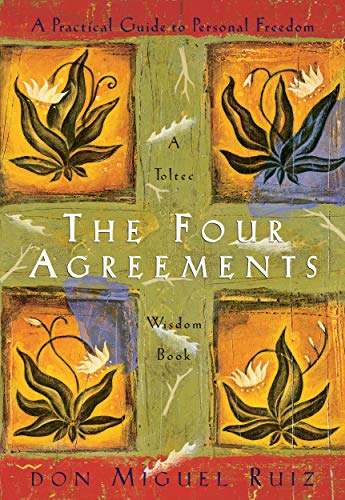

This article is an excerpt from the Shortform summary of "The Four Agreements" by Don Miguel Ruiz. Shortform has the world's best summaries of books you should be reading.
Like this article? Sign up for a free trial here .
Do you tend to take things personally? Are you always making assumptions? Are you a gossip?
The world today is full of suffering and cruelty. From birth, we are trained to accept society’s rules as “the way it is.” But, agreeing to these rules stops us from becoming our true selves. The good news is that there’s a different way to live.
Use these The Four Agreements exercises to help you implement a new approach to life.
The Four Agreements Exercises
If we replace the old agreements (society’s rules) with four simple new agreements, we can break free from the rules and find peace and happiness. Here are the new agreements: 1) Use your words impeccably. 2) Don’t take anything personally. 3) Don’t make assumptions. 4) Always do your best.
We’ve created seven The Four Agreements exercises with 21 discussion questions for you to go through on your own or with a group.
Exercise #1: The Power of Your Words
Use these questions to reflect on how your own words can have a powerful effect on yourself and others.
- What negative words do you say to yourself most? (Are you critical of your body? Your intelligence? Your success?)
- What will you say to yourself the next time you find yourself engaged in negative self-talk? Write out the actual new words you’ll say to yourself.
- How could you use the power of your words to lift someone else up? Think of one simple example and write it down here. Then do it immediately.
- After you’ve used your words to lift up someone, how do you feel? Should you do this more often?
Exercise #2: Don’t Gossip
Being impeccable with your words means speaking with integrity. Let’s think about how gossip fits into this.
- When is a recent time you’ve gossiped about someone or said something negative about someone behind their back? What did you say, and what motivated you to share that gossip?
- How did you feel about that gossip now? Do you think you should have shared the gossip?
- If you don’t think you should have gossiped, how could you have stopped yourself from gossiping at that time, even if others were participating? Will this help in the future?
Exercise #3: Taking Things Personally Can Damage You
Use these questions to reflect on the damage that taking things personally can inflict on your self-esteem.
- Think about a recent time when someone’s words hurt you. What was said? Why did it hurt you?
- Let’s try to overcome this feeling of being attacked and offended. How can you not take this type of comment personally? (Remember: Nothing they think about you is really about you. If someone gets upset at you, they’re dealing with their own issues. You don’t need to accept their emotional garbage.)
Exercise #4: Examining the Fallout From Assumptions
Use this exercise to reflect on how assumptions can hurt you and others.
- Think about a time you made a way-off-base assumption that turned out to be wrong. What was the assumption you made?
- What problems resulted because of your assumption? For example, you might have behaved differently or said something you didn’t mean.
- If you were to go back to that time, how could you have clarified the situation to find the truth? (Remember: Ask questions and communicate.)
Exercise #5: Reflect on the Idea of Doing Your Best
Use this exercise to examine why you sometimes don’t give your best effort.
- Think of the last time you know you didn’t do your best. What were you trying to do, and where did you fall short?
- How did you feel about yourself when you know you didn’t do your best? Did this feeling cause any other problems?
- Why didn’t you do your best? Part of it may be internal, and part of it may be external.
- Next time you run into a situation like this, what could you do differently to try to do your best? (These might be changes you make to your situation or internal thoughts you say to yourself.)
Exercise #6: Start Dismantling Your Old Agreements
Use this exercise to identify specific steps you can take to wipe out some old agreements holding you back.
- Think of a specific self-limiting, fear-based belief you think is holding you back. (You aren’t good at painting. You’re too clumsy to play a sport. You’re too old to take a challenging new job.) What’s yours?
- Think of a way to face this fear. What concrete steps can you take? (Buy some paints, and go for it. Join a softball team. Take the job and give it a whirl.)
Exercise #7: Forgiving Others
- Think of a person who has wronged you. What did this person do or say that is still sticking with you today?
- How does your anger toward this person affect you today? (Does it stop you from doing what you want to do? Does it affect your other relationships?)
- Think about how you’d feel if you forgave this person. (Reflect on the Second Agreement: it was about them, not about you). How would letting go of your hurt and anger change you?
———End of Preview———

Like what you just read? Read the rest of the world's best summary of Don Miguel Ruiz's "The Four Agreements" at Shortform .
Here's what you'll find in our full Four Agreements summary :
- What the Four Agreements are, and how they'll make you happier with life
- Why you need to take responsibility for your life, instead of blaming others
- How to achieve breakthroughs in your life and shake off old habits







I have started my subscription. How do I access the full “The Four Agreements Exercises: 21 Discussion Questions”?